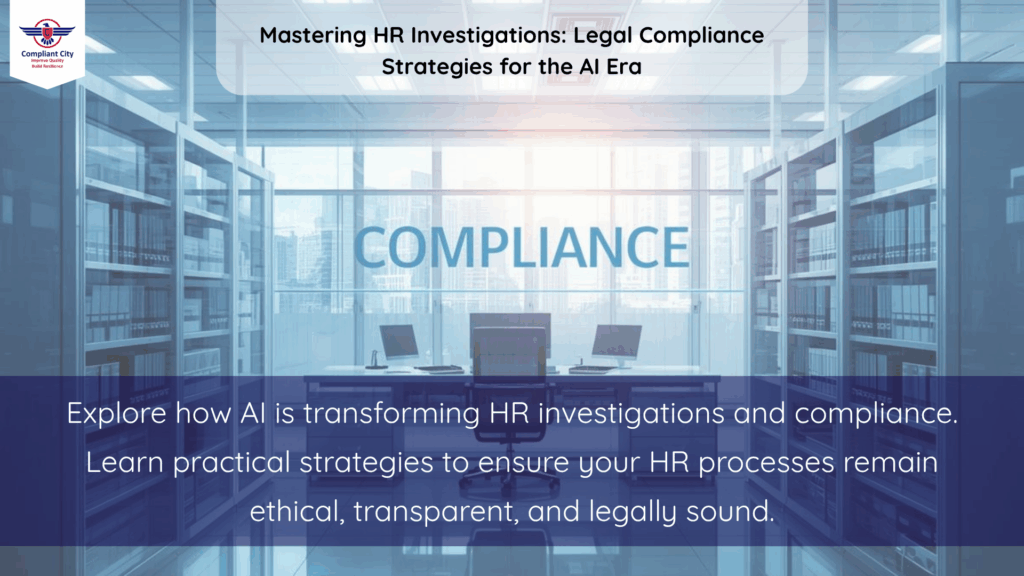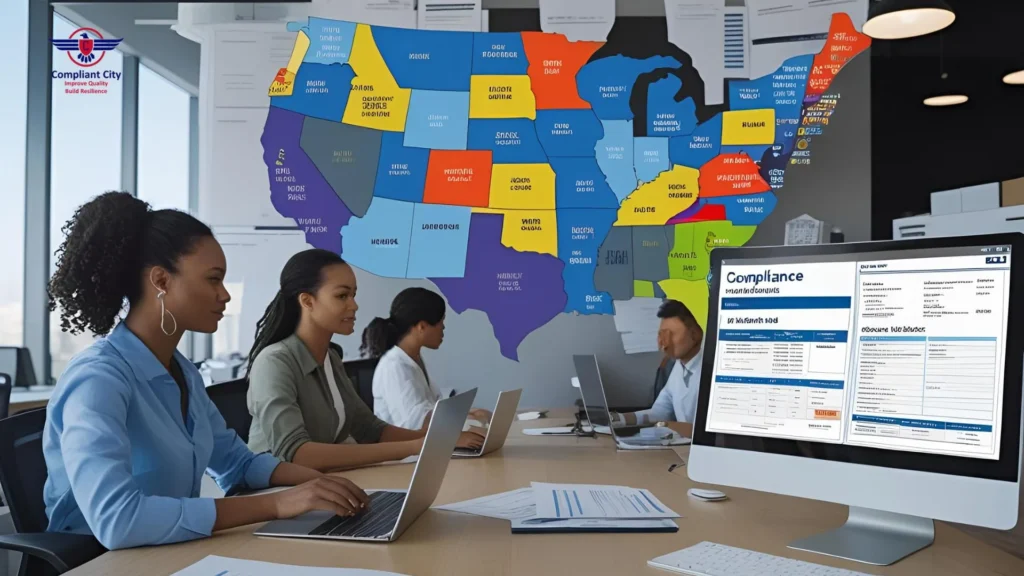In today’s rapidly changing business environment, artificial intelligence is changing businesses handle compliance, ethics, and HR. AI-driven applications may promise faster HR investigations and improvement of regulatory compliance training, but there are also new legal and ethical issues to consider.
As compliance professionals and HR leaders transition to a more automated workforce, one area to focus on is continuing to conduct HR investigations that are legally defensible.
The Growth of AI Technology in Compliance and Employment HR Investigations
Artificial Intelligence has entered the realm of compliance training online, HR training certifications, and HR Investigations as a strong partner. AI systems can now detect inconsistencies in behavior of employees, can analyze vast amounts of communication, and alert potential misconduct in real time.
For instance, AIs can follow along in employee emails and/or chats to identify harassment or policy violations – thus, developing the ability to respond quickly and perhaps forewarn or intervene. In a similar fashion, AI-based analytics can help compliance officers uncover risks before it becomes a lawsuit.
While AI systems create efficiencies, they still require consideration for legal and ethical implications all organizations need to manage.
Legal Exposure of AI in HR Investigations
Arguably, one of the most pressing questions for compliance professionals today is whether AI-Powered HR investigations will hold up under legal scrutiny.
1. Bias and Discrimination
AI-driven tools gather insights based on historical data. If the historical data has bias within it, (it may favor certain genders/ethnic groups) then AI systems could inadvertently replicate biases within the historical data. If an HR investigation-based AI tool yields bias, we may see serious legal implications for the employer as well as damaged reputation.
2. Privacy and Data Protection
Gathering and analyzing user data towards employees through AI must be strictly compliant with data protection legislation, including GDPR or CCPA . Mismanaging sensitive HR information could result in legal sanctions and loss of employee trust.
3. Due Process and Transparency
The lack of a clear explanation behind AI-generated decisions means reports may lack due process. HR practitioners are responsible for ensuring that all AI-led investigations retain human review to ensure there is a due process spirit in terms of fairness, transparency, and accountability.
4. Documentation and Audit Trails
Documentation that supports the integrity of your investigations are now a court’s and a regulator’s underpinning expectation. Every AI-assisted decision needs to be auditable and this means your compliance officer needs to know how to adequately document the AI process.
The Importance of Compliance Training in AI-Driven HR Investigations
As your organization introduces innovation versus improved employee experiences your organization has to address regulatory compliance and must enhance your compliance training practices under the broader compliance training model that will address reckless practices employees use under AI use.
1. Online Compliance Training
The recent practices of the compliance training practitioner include online learning methods as a means of increasing employee access, and they are also unconscious and unintentional compliance organizations are using to provide training to all employees on a flexible schedule that means employee and other access to training is increased.
2. Compliance Seminars/Webinars Background:
Another method of enhancing compliance training practices should I say or, for instance, attending compliance webinars or compliance seminars, led by knowledgeable or skilled compliance practitioners, imparting information to employees to remain active in compliance Application and law evolution.
3. HR Certification Programs
Whether it is enrolling and attending online HR Certification Programs and Seminars like PHR or SPHR, it conducts intensive study and increased comprehension of all legal compliance, including investigation functions and ethical decisions. When completed, you can keep these credentials valid and current.
Best Practices for Legally Sound HR Investigations in the AI Era
Here are key, actionable steps that human resources and compliance leaders can take to produce a process that they can be confident is also fair, lawful, and produces consistency:
1. Attention to the Human Element
AI should supplement — not supplant — human judgment. Investigators should always assess the findings generated by AI and conclude with human judgment, as the investigator may possess a wealth of contextual and interpersonal information not available to a machine.
2. Adopt Explicit Governance Policies for AI
Written policies should be created that describe the ways in which AI tools will be used in HR investigations, the type of data that may be processed, whether consent will be required, and how biases will be mitigated.
3. Active Training at Regular Intervals
HR Compliance training, investigative training, or other training related to AI ethics, workplace privacy, documentation, etc., should be reinforced often and should have regular intervals.
4. Confirmation of Findings
AI findings should be confirmed by a human review team or confirmation of findings should be made available to an HR review team to ensure the findings are valid (or defensible) and not biased.
5. Document, Document, Document
Every step of the investigation should include an audit platform that collects wide ranging information including providing information about mode of operation regarding AI data gathering, processing, and interpretation.
6. Be Contextually Relevant
Laws governing AI and employee data are changing rapidly. Staying connected through compliance webinars, compliance seminars, and Continuing Education programs will continue the quest for relevance.
The Role of Compliance Training in AI Workplaces
If your company has invested in regulatory compliance training, you are likely minimizing legal risks for your company and cultivating trust and engagement within your employee population.
A well-built online compliance training program will:
- Increases awareness of workplace ethical practices
- Decreases liability exposure
- Encourages uniform HR standards
- Encourages employees to identify and report rules violations
- Helps HR stay in compliance with new federal and other relevant laws
By recognizing compliance education as an opportunity to merge technology and human-led compliance training, organizations can develop an ethical framework that fosters both innovation and legality.

The Future: AI with an Ethical Compliance Culture
As AI becomes more embedded in HR processing, the emphasis changes from automation to ethical governance. Developing a compliance culture includes training teams, certifying HR professionals, and constantly improving investigation processes.
Progressive organizations are leveraging AI-based HR investigations for compliance not to replace the judgment of HR professionals. Organizations are blending compliance training into HR practices, knowledge of the law, and clear use of AI methods.
Combined with proper HR certification programs and ongoing compliance training through online programs, AI can have a significant impact on HR processes, making investigations quicker, fairer, and lawful.
FAQs
1. How can AI streamline HR investigations?
AI can swiftly examine communication patterns, uncover contradictions, and identify potential misconduct. Nevertheless, all results will be reviewed by trained HR investigators before being legally binding.
2. What is the risk of using AI in disciplinary investigations?
The risks of using AI in investigations are data privacy, algorithm bias, and lack of transparency about how some algorithms capture their results. Organizations can outlast the potential risks by having human oversight of the AI, and proper documentation of the reasons that guide the oversight.
3. Why is compliance training important in HR investigations?
Compliance in training ensures HR practitioners are aware of labor law, data protection legislation and the ethical standards surrounding compliance as they conduct their investigation.
4. Can the completion of online compliance training result in PHR or SPHR credits?
Yes many online certificate programs and seminars offered in HR provide PHR credits and the SPHR credits to keep HR professionals current in their credentials.
5. How do organizations maintain fairness in AI-based HR investigations?
By involving a human monitor, following an understandable AI model, and providing consistent compliance training online, organizations can conduct fair and non-bias extrema investigations that are defensible.
Conclusion
Artificial intelligence (AI) is making waves in compliance and HR investigations in a variety of industries! But the question of whether this form of investigation has legal leg is anchored on one essential factor: human intervention with strong compliance training.
Corporations focusing on regulatory compliance education, support of HR certifications, and robust ethical AI governance will not only be compliant, but they will also be at the forefront of responsible and innovative practices in employee relations.
The future of HR will be powered by AI, however, HR professionals will need to be sufficiently educated, trained, and compliant with overall values being a priority.



